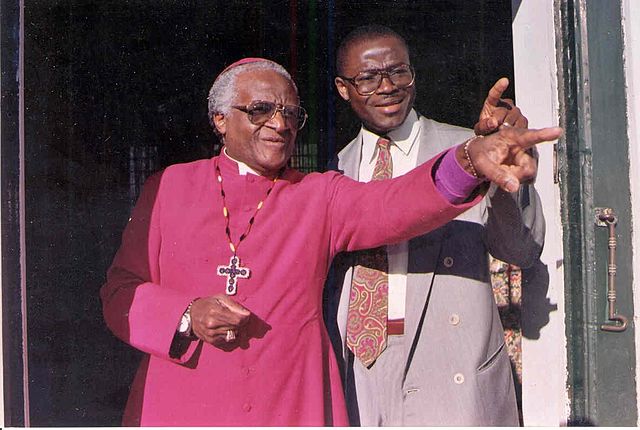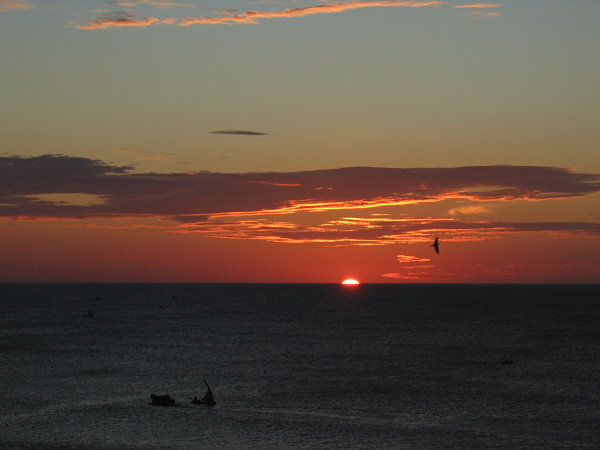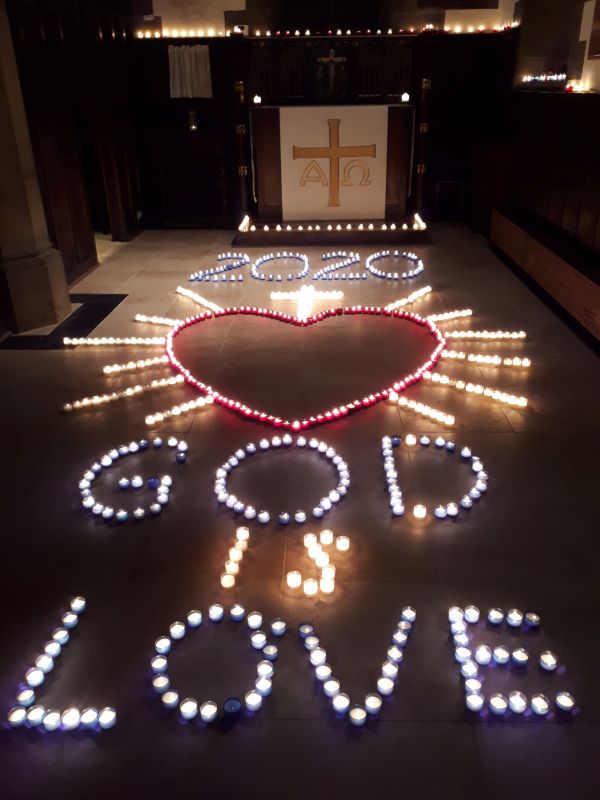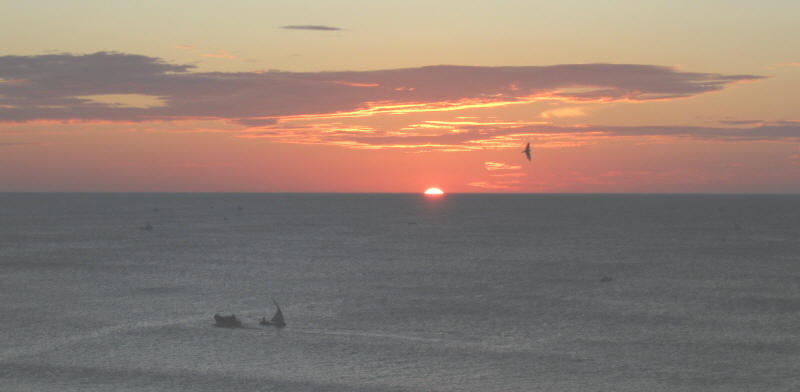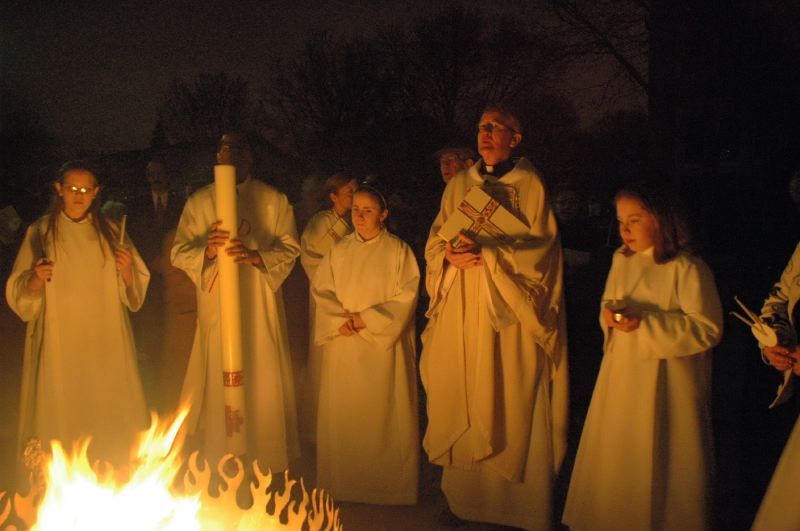Sermon for Christmas Eve at St Peter’s, Bramley
Text: John 1:1-14

It was a wonderful Christmas party, perhaps the best they had ever organised. The room was candlelit. Everyone who had been invited turned up, along with some friends who hadn’t. Some of them were dressed to the nines and brought gifts of champagne and flowers, some less well dressed with just a bottle of cheap wine, and some, well, we can overlook the jeans and work boots, but to bring nothing? Never mind, the house was full, Christmas lights were twinkling, music tinkling, glasses chinking, conversation flowing. The hosts enjoyed every minute of it, even if they never sat down themselves.
After midnight people started drifting away. Soon, the party was over. Then, the morning after. Not just the hangover, the piles of washing up, the tidying. It was the darkness. The darkness outside of another dismal December day, but also the darkness inside. The unpaid credit card bill. The new neighbours with their antisocial behaviour (who of course hadn’t been invited). The recently diagnosed illness that they hadn’t dared talk about to the guests. And most of all, the depression that so easily settles when reality hits and problems that won’t go away have to be faced.

In some ways, it was the same for Mary and Joseph. What a party they had that night! The glory of the Lord shone round about the stable, the angels sang, the wise men came in all their finery with gold, frankincense and myrrh, the shepherds came, underdressed and offering a symbolic lamb, and maybe the innkeeper even turned up with a flagon of the best Galilean wine. Everyone praised the newborn baby, to add to the prophecy Mary had already received. They were, that night, the most blessed family on earth.
But the shepherds returned to their fields, the magi hurried away for fear of Herod, the angels ceased their singing and the star faded. It was just another cold winter’s night in the unheated stable, far from home and with a newborn baby to care for. On top of that, the Magi’s warning of Herod’s wrath was weighing on their minds, and before long they were to become asylum seekers in Egypt. It must have felt a very dark time for them, when the party was over.
All these details of the familiar nativity story come either from the first three gospel accounts: Mark, Matthew and Luke, or later traditions. John starts his gospel in a very different way. It seems unimportant to him exactly when and where Jesus was born, or who visited him. This unique event was not to be limited to just one night in Bethlehem, or even the few years from the annunciation to Mary to the return from Egypt. The coming into the world of the very Word of God was, no, is, an event that ripples through space and time, affecting even this night our understanding of the world.
So how, on this Christmas night, does this cosmic event speak to us? Where is the darkness that threatens us, that will still be there when the Christmas celebrations are over? Our circumstances are all different. The darkness may be within our own minds, within our families, within the community we live in, or the problems of the world at large. As we walk through life, certain events will seem to cast a dark shadow over us. In my own household this year, we’ve had to cope with illness, injury, unemployment and expensive building works.
The apostle John wrote for people who were Jews by birth but, unlike their leaders, believed Jesus was the Son of God. Religious disagreement led to division, division to separation, and separation, for some, to martyrdom. A very dark time for the early Church, and no doubt one reason why John writes his prologue in terms of light versus darkness: the light of faith in Christ expressed in the love of the community, versus the darkness of unbelief and persecution from both Jews and Romans1.

Yet at the heart of this familiar passage is verse 5: “The light shines in the darkness, and the darkness did not overcome it”. This last phrase has been translated in many ways: the darkness “has never put out” the light, “could not overpower it”, “has not understood it”, “did not comprehend it”, “has not seized it”2 , or “has not welcomed it”.3. Taken together, these give us the powerful idea that the light is something that may be opposed, but is stronger than what opposes it, and ultimately cannot be stopped. There is no suggestion in the Gospel that the darkness ceases to exist when the light comes. Rather, the light prevents the darkness from having power over those who come to the light.
Later in his Gospel, John records Jesus saying “Believe in the light, that you may become children of light”, and again, “He who follows will not walk in darkness, but have the light of life”. 4 What John’s declaration to his community tells us is that whatever form darkness takes, the fact that God sent his son to become a man, born of a woman, has turned on a light that the darkness cannot turn out. And that light can be within each one of us.
This light is not about self-fulfilment. It’s a tapping into the glory of Christ who is ever present, connecting us with the rest of his community. As if the Star of Bethlehem rises within each of us whenever we turn, as it were, to the east: engaging in worship and prayer, paying attention to the divine source of that light. Just as a light turned on in a room gives light to that room even though it’s still dark outside, so the inner light of Jesus can help us to feel the brightness, the warmth, the comfort of his presence and of being part of his community, even though life’s circumstances may seem dark around us.
I therefore encourage you all to rejoice this night as we remember the birth of Jesus, and to celebrate the festival with your friends and family. And when the parties are over and normal life resumes through the winter, don’t forget that the Church keeps the season of Christmas right through January, finishing with the celebration of Candlemas on 2nd February. May you take this Christmas season to find the light of Christ within you. A light that can never be extinguished. Thanks be to God.
